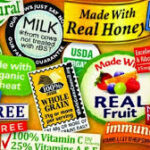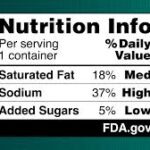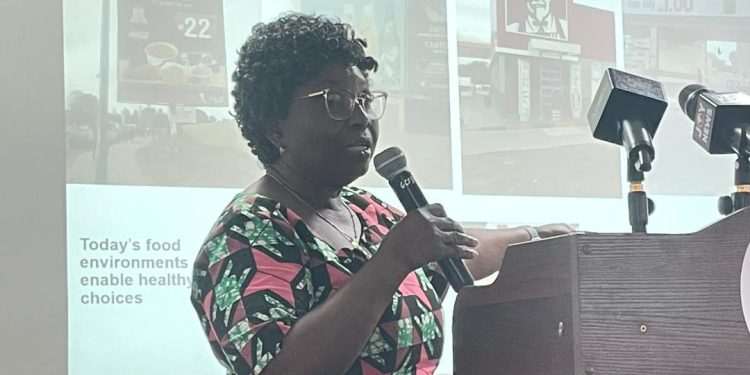FANIS joins experts and civil society to call for urgent policy action to safeguard public health
FANIS News | May 20, 2025
Ghana’s Processed Food Problem: A Growing Health Concern
Ghana is facing a surge in diet-related non-communicable diseases (NCDs)—including diabetes, obesity, hypertension, and heart disease—largely driven by the increasing consumption of ultra-processed foods high in sugar, salt, and unhealthy fats.
To combat this worrying trend, stakeholders are rallying behind a bold policy solution: mandatory front-of-pack (FOP) warning labels on food products.
Prof. Anna Lartey Sounds the Alarm
Speaking at the launch of a national advocacy campaign last Thursday, Professor Anna Lartey, former Director of Nutrition at the Food and Agriculture Organization (FAO) and now Adjunct Professor of Nutrition at the University of Ghana, called for immediate government action.
Prof. Anna Lartey
“We are witnessing rising cases of NCDs in Ghana. The foods flooding our markets—loaded with sugar, salt, and fat—are fueling this crisis,” – Prof. Lartey
With over three decades of experience in nutrition policy and research, Prof. Lartey is a respected voice in global public health. Her message was clear: Ghana needs robust labelling policies to help consumers make healthier food choices.
Why Front-of-Pack Warning Labels Matter
Currently, most packaged foods in Ghana lack visible, easy-to-understand warning labels. Nutritional information is often buried in fine print, making it inaccessible—especially for individuals with low literacy levels.
“We don’t need to be literate to eat healthy,” Prof. Lartey emphasized. “Simple colour codes or symbols—like a red warning icon—can instantly tell a shopper if a product is high in sugar or salt.”

Food Pack Label

Nutrition Label
“Front-of-pack labelling presents a simplified approach: it places critical nutrition information front and center so consumers can make quick, informed decisions about what they eat.”
Civil Society Pushes for Policy Action
The campaign, led by SEND-Ghana in collaboration with the Ghana Academy of Nutrition and Dietetics (GAND) and other stakeholders, aims to pressure policymakers into enacting mandatory warning label laws for food products.
“We welcome ongoing efforts to improve food safety, but we need urgent action,” said Harriet Nuamah Agyemang, Country Director of SEND-Ghana. “Government must move beyond intentions and deliver enforceable policy that protects consumers.”
Ms. Agyemang also emphasized the need for public education and tighter regulation of both local manufacturers and food importers to ensure full compliance.
What Ghana Stands to Gain
Advocates of the FOP warning label policy believe it could offer significant public health and regulatory benefits:
- Empower consumers with accessible nutrition information
- Reduce the burden of NCDs through better food choices
- Create legal grounds for regulating unhealthy food marketing
- Promote reformulation of food products by manufacturers
- Hold industry accountable for public health impact
A Call to Action for All Ghanaians
Ms. Agyemang urged citizens to take responsibility for their food choices and demand transparency from food producers.
“Read food labels. Ask questions. If you don’t understand what you’re reading, speak up,” she said. “Let’s hold manufacturers and importers accountable.”
She also called on key institutions like the media, the Ghana Education Service, and civil society organizations to support public education on food labelling and nutrition literacy.
FANIS’ Position
At FANIS (Food and Nutrition Information System), we strongly support this advocacy campaign. Mandatory front-of-pack warning labelling is not only a tool for improving individual health decisions—it’s a critical step toward building a healthier Ghana.
We join Prof. Lartey, SEND-Ghana, GAND, and all partners in urging the government to adopt this policy without delay.
📣 Let’s Act Now
🔸 Label it clearly.
🔸 Choose wisely.
🔸 Protect our future.
#KnowWhatYouEat | #FOPLabellingNow | #HealthyGhana | #FANISAdvocacy





